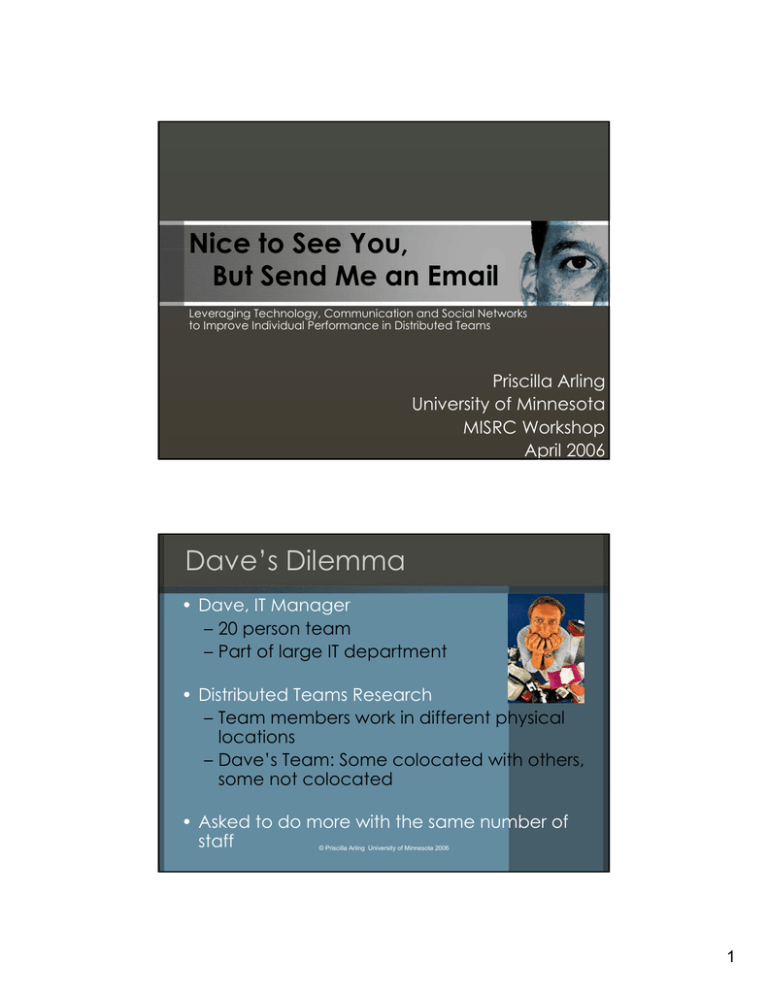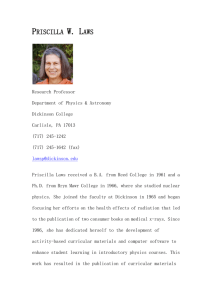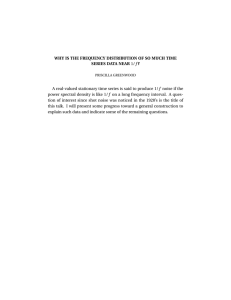Nice to See You, But Send Me an Email
advertisement

Nice to See You, But Send Me an Email Leveraging Technology, Communication and Social Networks to Improve Individual Performance in Distributed Teams Priscilla Arling University of Minnesota MISRC Workshop April 2006 Dave’s Dilemma • Dave, IT Manager – 20 person team – Part of large IT department • Distributed Teams Research – Team members work in different physical locations – Dave’s Team: Some colocated with others, some not colocated • Asked to do more with the same number of staff © Priscilla Arling University of Minnesota 2006 1 Dave’s Dilemma • How work gets done must change – Each team member has more task variety – Become more physically distributed • Place staff at client sites • Allow staff to work at home at times • Retain staff that moves out of area • Leverage outsourced staff • Other managers insist that all IT staff needs to be physically together • Resource implications of not being together – Need to see each other; performance may suffer © Priscilla Arling University of Minnesota 2006 Game Change • Field of Play has Changed • New Field / New Resources / New Rules • What are the new ‘rules’ for top performance? © Priscilla Arling University of Minnesota 2006 2 Top Performers Resource Use • Leverage location and communication mode – Face-to-face vs. electronic interactions – When to focus on face-to-face /electronic • With who, when, where • Two different patterns of interaction – Face-to-face resource network – Electronic resource network © Priscilla Arling University of Minnesota 2006 Research Project and Method • Social Network Survey and Analysis – Who do you communicate with on the team – Two types of networks: • Face-to-face vs. electronic communication • Analyze Patterns of Communication – Patterns Æ Resource access Æ performance • Questions – How does colocation with team members relate to these two types of networks? – Does more technology use make any difference? – How do the two networks relate to individual performance? • Tool for Managers to Use © Priscilla Arling University of Minnesota 2006 3 Social Networks Lin Harry Joe Tom Beth Smita © Priscilla Arling University of Minnesota 2006 Social Networks Prominence, visibility Cohesive Group Jon Yan Sue © Priscilla Arling University of Minnesota 2006 4 Research Sample • 254 people – 18 distributed teams • 9 organizations • Technology and Human Service teams • 7 global teams, 11 wholly based in U.S. • Individual resource access & performance – Not group performance © Priscilla Arling University of Minnesota 2006 Findings – Bad News / Good News • Colocation with team members – Resource access goes up – prominence, visibility – Even resource access in electronic networks is affected • As the number of colocated team members – Resource access goes down • As communication technology use – Prominence, visibility goes up © Priscilla Arling University of Minnesota 2006 5 Key Finding • Electronic networks were related to Individual Performance – No relation between Individual Performance & face-to-face networks • Being Visible in the Electronic Network is key to individual performance © Priscilla Arling University of Minnesota 2006 Insights • How to Play on the New Field – Value Electronic interactions as you would Face-to-face interactions • Respond in timely manner • Judicious use of electronic interactions • Balance: – A smaller set of close knit contacts you keep in touch with regularly – Larger set of less frequent contacts – Increase range and cross boundaries – physical, functional, status • Culture of working electronically • Agree upon electronic expectations © Priscilla Arling University of Minnesota 2006 6 Insights • Access to relational resources and performance does not have to degrade in distributed teams • Electronic interactions – Can be (HAVE TO BE?!) used to access resources that are associated with higher performance © Priscilla Arling University of Minnesota 2006 Making it Work for You • What patterns are related to higher performance in YOUR organization? • Do-it-Yourself Network Analysis • 5-10 minute questionnaire • Intrateam, interteam, interdepartment • Software for analysis is readily available © Priscilla Arling University of Minnesota 2006 7 Nice to Meet You….. Send Me an Email ! Parling@csom.umn.edu 8



